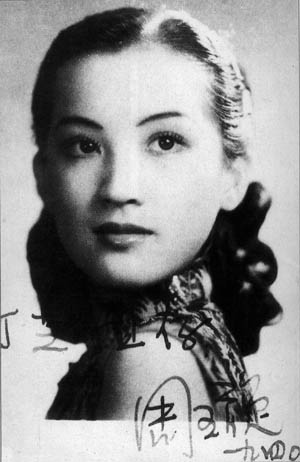周璇 《真善美》 (Truth, Virtue, Beauty) 1944
- 周璇 《真善美》
- Truth Virtue Beauty, 1944
- https://youtu.be/c8ydWD0QKk8

真善美,真善美, 它们的代价是脑髓, 是心血是眼泪, 哪件不带酸辛味? 真善美,真善美, 它们的代价是疯狂, 是沉醉是憔悴, 哪件不带酸辛味? 多少因循多少苦闷, 多少徘徊, 换几个真善美? 多少牺牲多少埋没, 多少残毁, 剩几个真善美? 真善美,真善美, 它们的欣赏究有谁? 爱好的有谁? 需要的有谁? 几个人知这酸辛味?
Truth, Virtue, Beauty; Truth, Virtue, Beauty. They are the nervous breakdowns, Sweat, and tears. How do they taste? Truth, Virtue, Beauty; Truth, Virtue, Beauty. Their cost is insanity, Intoxication, and despondency. Which's not bitter? How many failings, dejections, and futilities, Buys how much truth, virtue, and beauty? What sacrifices, oblivion, What wreckage, For how much truth, virtue, and beauty? Truth, Virtue, Beauty; Truth, Virtue, Beauty. Just who appreciates them? Who loves them? Who needs them? Do you know their costs?
- Title: 真善美 (Truth, Virtue, Beauty).
- Singer: 周璇 Zhou1 Xuan2.
- Lyrics: 李雋青.
- Music: 侯湘 (李厚襄(1916─1973)).
- Source: 《鸞鳳和鳴》(1964) 電影插曲.
- Translation: 李杀 (Xah Lee).
Singer Zhou Xuan 周璇
Zhou Xuan 周璇 (1918 to 1957) is an orphan, and was the biggest Asian superstar in the 1940s and 1950s. She had a tough life, and she died of a nervous breakdown at age 39.
Zhou Xuan (Chinese: 周璇; pinyin: Zhōu Xuán; born Su Pu simplified Chinese: 苏璞; traditional Chinese: 蘇璞; pinyin: Sū pú; August 1, 1918 to September 22, 1957), also romanized as Chow Hsuan, was an iconic Chinese singer and film actress. By the 1940s, she had become one of China's Seven Great Singing Stars. She was the best known of the seven, nicknamed the “Golden Voice”, and had a concurrent movie career until 1954. She recorded more than 200 songs and appeared in over 40 films in her career.[1]
Zhou was born Su Pu (蘇璞), but was separated from her natural parents at a young age and raised by adoptive parents. She spent her entire life searching for her biological parents but her parentage was never established until after her death.[2]
According to later family research, a relative who was an opium addict took her at the age of 3 to another city and sold her to a family named Wang, who named her Wang Xiaohong. She was later adopted by a family named Zhou, changing her name to Zhou Xiaohong.[3]
At the age of 13, she took Zhou Xuan as her stage name, 'Xuan' (璇) meaning beautiful jade in Chinese.
In 1957 she died in Shanghai in a mental asylum at the age of 39 during the Anti-Rightist Movement.[4] A possible cause of death may be encephalitis following a nervous breakdown. Zhou's diary concluded that she suffered from cerebritis.
[2018-12-10 Wikipedia Zhou Xuan]
周璇(1920年8月1日-1957年9月22日),原名苏璞,后改名王小红、周小红,江苏常州人,1930年代至1940年代著名歌星、影星,有「金嗓子」、「歌后」和「影后」之称。
周璇原名蘇璞,1920年8月1日出生於江蘇常州一個知識份子家庭。父親蘇調夫畢業於金陵大學,先后做过牧师和教师,在常州城颇有名气;母親顧美珍畢業於金陵女子大學。周璇年幼時被抽鴉片的舅舅拐賣到金坛县,從此與親生父母失散。至六歲時在上海為周家所養,改名周小紅,養父周文鼎,養母叶凤妹。
1931年周小紅加入黎錦暉創建的明月歌舞團(又名聯華歌舞班)。在一次演出中周小紅演唱《民族之光》一曲有「與敵人周旋於沙場之上」一句歌詞,受到聽眾熱烈讚賞,因此黎錦暉便替周小紅起了一個藝名周璇。
抗戰勝利後,周璇在香港和上海之間穿梭,為了主演在香港開拍的《長相思》、《各有千秋》、《莫負青春》、《清宮秘史》等影片。1950年返回上海,參加影片《和平鴿》的拍攝,因患病而被迫中止。1951年夏天,周璇在拍攝電影片《和平鴿》時,突發精神病,被送入上海虹橋療養院。1957年6月18日,周璇康復準備出院,但在7月19日突發急性腦膜炎,經專家醫治無效,於1957年9月22日晚上8:55分病逝于华山医院,享年37歲。